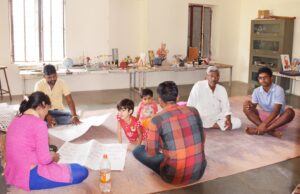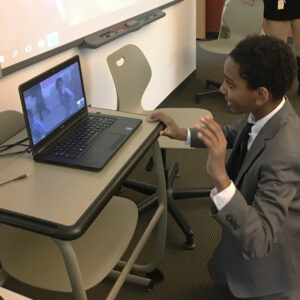The ways in which we interact with other societies is changing as quickly as civilizations themselves are. By-the-book learning is a classic technique for gaining knowledge about the world. However, it has its limitations. Paired with video calls between distant countries, education will seamlessly weave cultures together into a world of partnership, empathy and insight. New methods of interfacing are progressing through none other than our youth, who have begun to connect through live Skype videos with one another.
Beginning in 2017, students from a night school in India have periodically been Skyped into video conferences with American day school children. This initiative was spawned by a student of Haverford’s Middle School of Pennsylvania, who aspired to connect students at an international level. His concept has enabled children from both countries to learn about one-another in a way that young students seldom have the occasion to do.
We live in an age where technology can efficiently strengthen the bonds of a rich multiplicity of nations. Now more than ever, these advancements mitigate the gaps between developed and developing communities. As children, our impressions of the world will heavily influence the choices we condone as we mature into informed citizens.
Yeshwin Sankuratri of Haverford School, then 15 years old, had been fostering his idea for 5 years with the assistance of Barefoot College’s CEO Meagan Fallone. Yeshwin has aspired to connect and empower the youth of less privileged countries, and as you will read, expand these efforts into more impactful initiatives that will continue to instill awareness and raise funds on a much larger scale. With the support of the Education and Technology Team, they were able to connect the 8th-grade American youth to students to a Night School from Jamuniya Kanya Tola village in Rajasthan, India.
Supplementing their curriculum, the two American World Cultures classes of about 40 students were provided with a unique, first-hand primer that treads beyond the pages of their schoolbooks. It’s the sort of lesson that resonates continuously with people, giving names to the faces of children they may only learn about in class without ever having the fortuity to meet.
Educating and elevating the underprivileged is one of Yeshwin’s many passions. Sometimes it is from the youngest that the most enthusiastic committment comes. – Prayag Ichangimath, coordinator for STEM at Barefoot College
Students from Yeshwin’s school were immediately receptive to the Skype call, engaging positively while keen to ask and answer the questions that were exchanged. The students quickly developed an awareness of the privileges that they had formerly taken for granted in their own lives.
The students were very excited to be interacting with a vastly different culture and lifestyle from their own. –Yeshwin
These calls encouraged the students to share their usual routines, the content they learn during a regular school day and the activities that they enjoy on a daily basis. Students from Jamuniya Kanya Tola Night School shared a popular local song, while students from Haverford sang their National Anthem for the Night School students. Yeshwin also visited the Night School in India, where he exchanged information with the rural students and Barefoot College, that in turn, he could share with his American class upon returning.

Yeshwin notes that his Haverford classmates were eager to continue interacting with the India night school students on a frequent basis. The American students began proposing plans for how they could assist the students of Jamuniya Kanya Night School, and help support underserved societies in meaningful ways. They have already been brainstorming ways that they can raise funds and adpot the night school.
After this, we plan to raise funds to adopt a night school. I’m still brainstorming different ways and opportunities to make this happen. – Yeshwin
The communion of young students from distant countries helps cultivate receptive and progressive societies. Children who are introduced to the diversity of our planet at an early onset concurrently develop into young adults that easily comprehend and respect the differences and similarities between nations in a way that enriches all our lives.
The enthusiasm and positive energy provided by the students participating paints a picture of an encouraging future, where people inhabiting regions across the planet from one-another harness a deep understanding of the cultural diversity spanning countries that they may never set foot in. This initial enthusiasm assists in inspiring students to grow up and become humanitarians, and adults who are eager to make a difference in communities that have fewer privileges or resources available to them.
Yeshwin and his classmates’ efforts don’t stop at just the funding level:
Along with fundraising, I feel the next step is to start a ‘Barefoot Youth Group’ which can be a real sector/initiative of the Barefoot College – Yeshwin

This exposure is crucial to developing young citizens everywhere that empathize with and respect the lifestyles of other cultures. In turn, children of rural areas will gain empowerment, while urban youth can recognize the advantages they are fortunate to have. Each is given a vital opportunity to appreciate the other on a fundamentally human level that is not as easily achieved without real, face-to-face introductions.
Video calls between schools from different countries is an exceptional idea that hopefully will be adopted by other schools in the future. These are the kinds of plans that will bring nations closer together- as both allies and equals in the foreseeable future.
For more information about Barefoot’s Rural Education programs please contact Shuvajit@barefootcollege.org or contribute to our education programs here.

